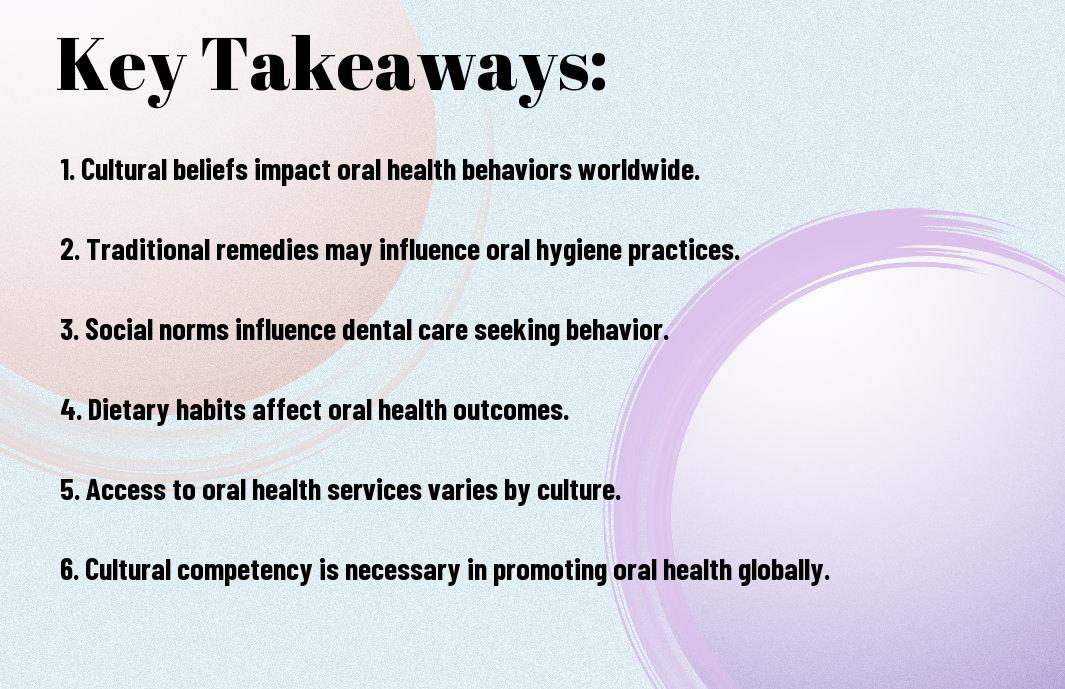Over generations, cultural influences have played a significant role in shaping oral health practices around the world. From traditional remedies to modern dental care routines, each culture brings a unique perspective to the way oral health is approached. Understanding these diverse practices is crucial in promoting better oral health outcomes globally. This blog post will explore into the impact of culture on oral health practices, highlighting both the positive and potentially harmful effects that cultural beliefs and practices can have on oral health.
Key Takeaways:
- Cultural beliefs impact oral health practices: Cultural traditions and beliefs can significantly influence the way people approach oral health practices, including diet, oral hygiene habits, and seeking professional dental care.
- Socioeconomic factors play a role: Socioeconomic status can affect access to oral health care services, leading to disparities in oral health outcomes globally. Cultural norms surrounding oral health can also be intertwined with socioeconomic factors.
- Educational initiatives are crucial for improving oral health worldwide: Providing culturally sensitive education about oral health can help bridge gaps in understanding and promote better oral health practices across diverse communities. Tailoring initiatives to respect cultural beliefs is imperative for global success in oral health promotion.
The Role of Culture in Shaping Oral Health Practices
While many factors influence oral health practices around the world, culture plays a significant role in shaping these behaviors. Cultural beliefs, traditions, and dietary habits all contribute to the oral health practices of different populations.
Traditional Oral Health Beliefs and Behaviors
Practices passed down through generations often shape the way individuals approach oral health. For example, in some cultures, the use of herbal remedies or traditional rituals for oral hygiene is common. These beliefs can impact the willingness of individuals to seek modern dental care and influence their overall oral health outcomes.
Furthermore, certain cultural practices may prioritize the preservation of teeth for aesthetic or symbolic reasons, leading to unique approaches to oral health maintenance. Understanding and respecting these traditional beliefs is crucial for promoting effective oral health practices among diverse populations.
Cultural Variations in Dietary Practices Affecting Oral Health
Practices surrounding dietary habits can significantly impact oral health outcomes. Cultural variations in food choices, meal preparation methods, and eating patterns can influence the prevalence of dental issues such as cavities and gum disease. For example, diets high in sugar or acidity are commonly linked to an increased risk of tooth decay.
Plus, incorporating nutrient-rich foods like fruits, vegetables, and dairy products that are culturally relevant can help promote strong teeth and gums. By recognizing the role of cultural dietary practices in oral health, healthcare professionals can provide targeted education and interventions to support healthier habits.
Cultural Practices and Modern Dentistry
Many cultural practices have influenced the way oral health is perceived and treated globally. While modern dentistry has advanced significantly, traditional beliefs and practices still play a significant role in shaping oral health practices around the world.
Integration of Traditional Methods with Modern Dentistry
For some communities, integrating traditional methods with modern dentistry is crucial for maintaining oral health. This approach acknowledges the cultural significance of certain practices while ensuring that patients also benefit from the advancements in dental care. By incorporating traditional remedies, such as herbal treatments or specific rituals, alongside modern preventive measures and treatments, a more holistic approach to oral health can be achieved.
Additionally, this integration promotes a sense of cultural continuity and fosters trust between the healthcare provider and the patient. It allows individuals to feel respected and understood, leading to better communication and cooperation in addressing oral health issues.
Challenges and Benefits of Cross-Cultural Dental Practices
Cultural influences can present both challenges and benefits in cross-cultural dental practices. Challenges may arise when traditional practices conflict with evidence-based modern dental procedures or when cultural beliefs hinder the acceptance of certain treatments. These obstacles can impede optimal oral health outcomes and create barriers to effective communication between patients and dentists.
Benefits of cross-cultural dental practices include the opportunity to learn from diverse cultural perspectives and incorporate valuable traditional knowledge into modern dental care. By embracing cultural diversity, dental professionals can tailor their approaches to better meet the needs and preferences of patients from different cultural backgrounds, ultimately improving access to quality oral healthcare for all.
Challenges in cross-cultural dental practices often stem from a lack of understanding or ignorance of cultural practices, leading to misunderstandings and inadequate care. To address these challenges effectively, dental professionals must undergo cultural competency training and actively engage with diverse communities to build trust and enhance the quality of care provided.
Education and Promotion of Oral Health Across Cultures
To effectively promote oral health across different cultures, it is crucial to understand and respect the diverse beliefs, customs, and practices that influence individuals’ oral health behaviors. Cultural sensitivity plays a vital role in designing educational programs that resonate with people from various backgrounds. One strategy for achieving cultural sensitivity in oral health education is to collaborate with local community leaders and healthcare providers to gain insights into the cultural norms and values that may impact oral health practices.
Strategies for Cultural Sensitivity in Oral Health Education
An necessary aspect of promoting oral health awareness is ensuring that educational materials and messages are culturally appropriate and easily understood by the target audience. Adapting the content to align with cultural preferences and languages can enhance the effectiveness of oral health campaigns. Another strategy is to involve community members in the planning and implementation of educational initiatives, as this fosters trust and promotes greater engagement in oral health promotion efforts.
Evaluating the Impact of Oral Health Campaigns Globally
Globally, evaluating the impact of oral health campaigns is necessary to determine their effectiveness and to identify areas for improvement. Through rigorous data collection and analysis, researchers can assess the reach, engagement, and behavioral changes resulting from these campaigns. This process enables policymakers and healthcare professionals to make informed decisions and allocate resources effectively to improve oral health outcomes worldwide.
Final Words
Summing up, cultural influences play a significant role in shaping oral health practices on a global scale. From the types of foods consumed to traditional beliefs about oral hygiene, different cultures have unique approaches to maintaining oral health. Understanding these cultural influences is crucial in developing effective public health strategies that cater to diverse populations. By acknowledging and respecting cultural differences, oral health providers can better engage with communities and promote practices that align with their beliefs and values. Ultimately, a global perspective on cultural influences on oral health practices is vital in promoting oral health equity and improving overall oral health outcomes worldwide.
FAQ
Q: What are cultural influences on oral health practices?
A: Cultural influences on oral health practices refer to the impact of cultural beliefs, traditions, and norms on how individuals approach and maintain their oral health. These influences can affect practices such as dental hygiene routines, dietary habits, and attitudes towards seeking dental care.
Q: How do cultural influences vary on a global scale?
A: Cultural influences on oral health practices can vary significantly across different regions and countries. For example, some cultures may have specific rituals or traditional remedies for maintaining oral health, while others may prioritize modern dental care practices. These variations are influenced by factors such as social norms, religious beliefs, and access to healthcare.
Q: Why is it important to consider cultural influences on oral health practices?
A: Understanding cultural influences on oral health practices is crucial for developing effective public health strategies and interventions. By acknowledging and respecting cultural diversity, healthcare professionals can tailor their approaches to better meet the needs of diverse populations. This can help improve oral health outcomes and promote greater access to quality dental care for all individuals.







